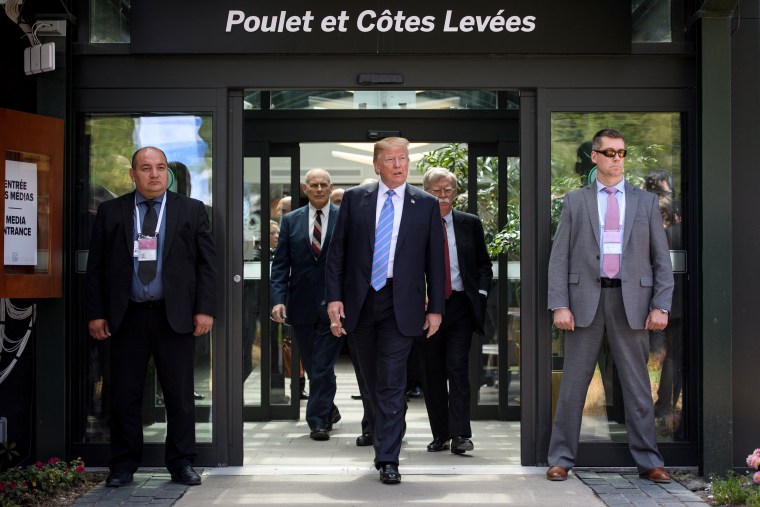TORONTO — President Donald Trump isn’t the only political luminary now willing to cast aside diplomatic precedents.
Prominent figures in both parties are criticizing him for Saturday’s abrupt withdrawal from a G-7 communiqué — even though Trump is abroad and Washington’s political class has long observed the maxim that politics should end at the water’s edge.
More unusually, some of them are addressing foreign nations directly to say that Trump doesn’t speak for all Americans.
"To allies & friends: Be patient, Mr. Trump is a temporary aberration. The America you once knew will return," John Brennan, the CIA director under President Barack Obama and a national security and intelligence analyst for NBC News, wrote to Trump on Twitter Sunday morning. “Your worldview does not represent American ideals.
His post followed a similar missive from Sen. John McCain, R-Ariz., a longtime Trump critic who was the Republican Party’s presidential nominee in 2008.
“To our allies: bipartisan majorities of Americans remain pro-free trade, pro-globalization & supportive of alliances based on 70 years of shared values,” McCain wrote. “Americans stand with you, even if our president doesn’t.”
The backlash from McCain and Brennan came as Trump was en route to Singapore, where he landed Sunday in advance of his meeting Tuesday with North Korean leader Kim Jong Un Tuesday to discuss nuclear disarmament.
Meanwhile, stateside Sunday, Sen. Ben Sasse, R.-Neb., criticized Trump's tactics at the G-7 in a statement, noting that "if the President was actually serious about leading the expansion of a G-7 no-tariff, free-trade agreement... I would happily carry his bags to every single meeting of those negotiations."
But the Nebraska senator appeared less than convinced.
"The path to more trade begins with less whining on the global stage," he added in the statement.
But it wasn’t just the G-7 communiqué that prompted rebukes of Trump during his foreign travels. Even before that, he roiled the foreign policy establishment by calling for Russia to be readmitted to the G-7, and he’s gotten pushback from both parties in Congress over his decision to lift sanctions on the Chinese telecommunications company ZTE.
House Minority Leader Nancy Pelosi, D-Calif., hit him on both counts Saturday.
“This week started with @realDonaldTrump boosting a Chinese company identified as a national security threat to the U.S,” she wrote on Twitter. “It ended with him standing up for Russia and alienating our allies at the G7. #MAGA.”
Senate Minority Leader Chuck Schumer, D-N.Y., said it was unclear whether Trump had executed America or Russia's diplomatic and national security strategy.
Other modern presidents have occasionally had to deal with criticism or name-calling while they were overseas, but that has generally been both aberrant and frowned-upon.
Now, American political battles seem sure to follow Trump wherever he goes.
